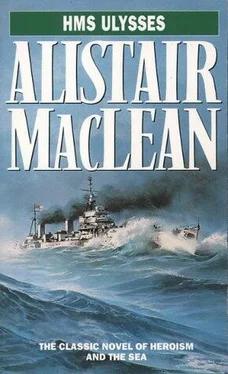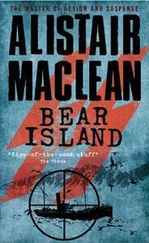Carrington laid the heels of his hands against the iron steps of the ladder, heaved with all his strength. Suddenly he heard a splash, then a metallic clatter, whirled round just in time to see a crowbar clutched in an enormous hand disappear below the edge of the hatch. There was no sign of Petersen. Like many big, powerful men, he was lithe and cat like in his movements: he'd gone down over the edge of that hatch without a sound.
"Petersen!" Carrington was on his knees by the hatch. "What the devil do you think you're doing? Come out of there, you bloody fool Do you want to drown?"
There was no reply. Complete silence below, a silence deepened by the gentle sussuration of the water. Suddenly the quiet was broken by the sound of metal striking against metal, then by a jarring screech as the hatch dropped six inches. Before Carrington had time to think, the hatch cover dropped farther still. Desperately, the First Lieutenant seized a crowbar, thrust it under the hatch cover: a split second later the great steel cover thudded down on top of it. Carrington had his mouth to the gap now.
"In the name of God, Petersen," he shouted, "Are you sane? Open up, open up at once, do you hear?"
"I can't." The voice came and went as the water surged over the stoker's head. "I won't. You said yourself... there is no time... this was the only way."
"But I never meant------"
"I know. It does not matter... it is better this way." It was almost impossible to make out what he was saying. "Tell Captain Vallery that Petersen says he is very sorry.... I tried to tell the Captain yesterday."
"Sorry I Sorry for what?" Madly Carrington flung all his strength against the iron bar: the hatch cover did not even quiver.
"The dead marine in Scapa Flow... I did not mean to kill him, I could never kill any man... But he angered me," the big Norwegian said simply. "He killed my friend."
For a second, Carrington stopped straining at the bar. Petersen! Of course, who but Petersen could have snapped a man's neck like that.
Petersen, the big, laughing Scandinavian, who had so suddenly changed overnight into a grave unsmiling giant, who stalked the deck, the mess decks and alleyways by day and by night, who was never seen to smile or sleep. With a sudden flash of insight, Carrington saw clear through into the tortured mind of that kind and simple man.
"Listen, Petersen," he begged. "I don't give a damn about that. Nobody shall ever know, I promise you. Please, Petersen, just------"
"It is better this way." The muffled voice was strangely content.
"It is not good to kill a man... it is not good to go on living.... I know... Please, it is important, you will tell my Captain Petersen is sorry and filled with shame... I do this for my Captain." Without warning, the crowbar was plucked from Carrington's hand. The cover clanged down in position. For a minute the wheelhouse flat rang to a succession of muffled, metallic blows. Suddenly the clamour ceased and there was only the rippling surge of the water outside the wheelhouse and the creak of the wheel inside as the Ulysses steadied on course.
The clear sweet voice soared high and true above the subdued roar of the engine-room fans, above the whine of a hundred electric motors and the sound of the rushing of the waters. Not even the metallic impersonality of the loudspeakers could detract from the beauty of that singing voice.... It was a favourite device of Vallery's when the need for silence was not paramount, to pass the long, dark hours by coupling up the record player to the broadcast system.
Almost invariably, the musical repertoire was strictly classical, or what is more often referred to, foolishly and disparagingly, as the popular classics. Bach, Beethoven, Tchaikovski, Lehar, Verdi, Delius, these were the favourites.
"No. in B flat minor," "Air on a G string,"
"Moonlight on the Alster," "Claire de Lune," "The Skater's Waltz", the crew of the Ulysses could never have enough of these. "Ridiculous," "impossible", it is all too easy to imagine the comments of those who equate the matelot's taste in music with the popular conception of his ethics and morals; but those same people have never heard the hushed, cathedral silence in the crowded hangar of a great aircraft carrier in Scapa Flow as Yehudi Menuhin's magic bow sang across the strings of the violin, swept a thousand men away from the harsh urgencies of reality, from the bitter memories of the last patrol or convoy, into the golden land of music.
But now a girl was singing. It was Deanna Durbin, and she was singing
"Beneath the Lights of Home," that most heartbreakingly nostalgic of all songs. Below decks and above, bent over the great engines or huddled by their guns, men listened to the lovely voice as it drifted through the darkened ship and the falling snow, and turned their minds inwards and thought of home, thought of the bitter contrast and the morning that would not come. Suddenly, half-way through, the song stopped.
"Do you hear there?" the 'speakers boomed. "Do you hear there? This, this is the Commander speaking." The voice was deep and grave and hesitant: it caught and held the attention of every man in the ship.
"I have bad news for you." Turner spoke slowly, quietly. "I am sorry, I..." He broke off, then went on more slowly still. "Captain Vallery died five minutes ago." For a moment the 'speaker was silent, then crackled again. "He died on the bridge, in his chair. He knew he was dying and I don't think he suffered at all.... He insisted, he insisted that I thank you for the way you all stood by him. 'Tell them', these were his words, as far as I remember, 'tell them,' he said, 'that I couldn't have carried on without them, that they are the best crew that God ever gave a Captain.' Then he said, it was the last thing he said:' Give them my apologies. After all they've done for me, well, well, tell them I'm terribly sorry to let them down like this.' That was all he said, just' Tell them I'm sorry.' And then he died."
CHAPTER SIXTEEN
SATURDAY NIGHT
RICHARD VALLERY was dead. He died grieving, stricken at the thought that he was abandoning the crew of the Ulysses, leaving them behind, leaderless. But it was only for a short time, and he did not have to wait long. Before the dawn, hundreds more, men in the cruisers, the destroyers and the merchantmen, had died also. And they did not die as he had feared under the guns of the Tirpitz, another grim parallel with PQ17, for the Tirpitz had not left Alta Fjord. They died, primarily, because the weather had changed.
Richard Vallery was dead, and with his death a great change had come over the men of the Ulysses. When Vallery died, other things died also, for he took these things with him. He took with him the courage, the kindliness, the gentleness, the unshakable faith, the infinitely patient and understanding endurance, all these things which had been so peculiarly his own. And now these things were gone and the Ulysses was left without them and it did not matter. The men of the Ulysses no longer needed courage and all the adjuncts of courage, for they were no longer afraid. Vallery was dead and they did not know how much they respected and loved that gentle man until he was gone. But then they knew. They knew that something wonderful, something that had become an enduring part of their minds and memories, something infinitely fine and good, was gone and they would never know it again, and they were mad with grief. And, in war, a grief-stricken man is the most terrible enemy there is. Prudence, caution, fear, pain-for the grief-stricken man these no longer exist. He lives only to lash out blindly at the enemy, to destroy, if he can, the author of his grief.
Rightly or wrongly, the Ulysses never thought to blame the Captain's death on any but the enemy. There Was only, for them, the sorrow and the blind hate. Zombies, Nicholls had called them once, and the Ulysses was more than ever a ship manned by living zombies, zombies who prowled restlessly, incessantly, across the snow and ice of the heaving decks, automatons living only for revenge.
Читать дальше
Конец ознакомительного отрывка
Купить книгу












